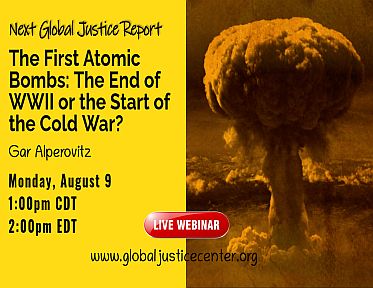Talk: The First Atomic Bombs: The End of WWII or the Start of the Cold War ? [] Center for Global Justice
Event Category: Presentations/Discussions
-
Monday, August 9, 20211:00pm CDT – 2:00pm EDTGar Alperovitz
Following on his August 8 talk at the Unitarian Universalist Fellowship on the moral aspects of the decision to drop the atomic bomb on Hiroshima and Nagasaki 76 years ago, Gar Alperovitz will look at the geopolitical implications of that fateful decision. Was it the opening shot in the Cold War, designed to send a message to the Soviet Union? It established U.S. dominance in the Pacific and put the U.S. in a powerful position to shape post-war Europe. A nuclear arms race was soon to follow as tensions grew between the two former allies. Some have argued that the existence of nuclear weapons and the fear of nuclear annihilation helped prevent military conflict between the US and USSR during the Cold War. But smaller proxy wars killed millions in the global South and wasted trillions of dollars of resources, leaving us all less secure.
In recent years the public has become aware of the existential threat climate change presents for humanity. But how about the threat of nuclear war and the nuclear winter that will surely follow? Billions of people will either be annihilated instantly or face slow starvation as agriculture collapses. Today humanity urgently needs nuclear disarmament. Yet most of the treaties that had limited nuclear weapons have been cast aside by President Trump and the Biden Administration is increasing our nuclear arsenal, threatening a new arms race. With a new Cold War developing with China and maybe Russia, the importance of treaties limiting nuclear weapons becomes clearer. The Bulletin of Atomic Scientists has now set their doomsday clock at 100 seconds before midnight. The need for citizen action is urgent.
What we do The Center engages in local community support and outreach to promote and advance initiatives and movements toward social justice, grassroots empowerment and democracy, and environmental sustainability. It is also devoted to critical analysis of the processes and impacts of globalization, both local and international. The Center works to develop alternative socio-economic systems that conserve and share the world’s cultural, economic, and environmental resources for the benefit of humankind.
-
-


